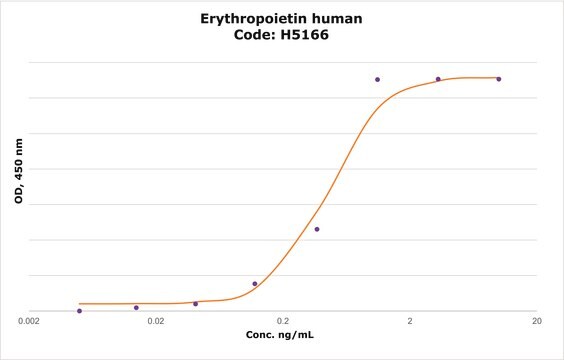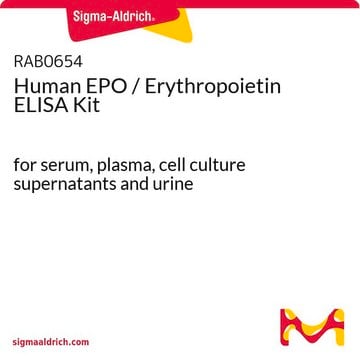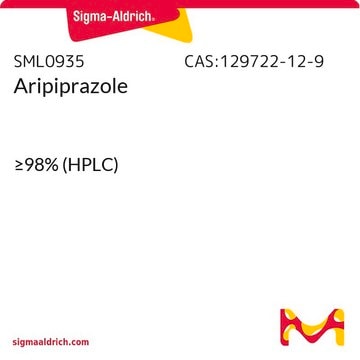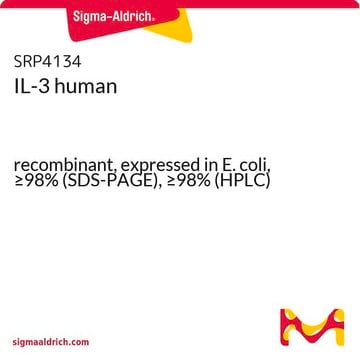E5546
Erythropoietin (EPO) human
recombinant, expressed in HEK 293 cells, suitable for cell culture
Synonym(s):
EPO, epoetin, hematopoietin, hemopoietin
Sign Into View Organizational & Contract Pricing
All Photos(2)
About This Item
UNSPSC Code:
12352202
NACRES:
NA.77
Recommended Products
recombinant
expressed in HEK 293 cells
Assay
≥98% (SDS-PAGE)
form
lyophilized powder
potency
≤2.5 ng/mL ED50 (measured in a cell proliferation assay using TF-1 human cells)
technique(s)
cell culture | mammalian: suitable
impurities
Endotoxin, tested
storage temp.
−20°C
Related Categories
General description
Recombinant human erythropoietin (EPO) is expressed in human HEK 293 cells as a glycoprotein with a calculated molecular mass of ~18 kDa. This protein is manufactured in human cells using an all-human production system, with full chemically defined ingredients and with no serum. The human cells expression system allows human-like glycosylation and folding, and often supports better stability of the protein in culture. The protein is produced with no artificial tags.
Biochem/physiol Actions
Erythropoietin (EPO) is a glycoprotein hormone, known for its erythropoietic activity. It is used as treatment for anemia in humans with renal failure or cancer. EPO also reduces the amount of blood transfusions required on premature infants and surgeries.
EPO consists of 165 amino acids and has a high carbohydrate content, of both N-linked and O-linked types. The oligosaccharide chains are responsible for EPO production, secretion, longevity, and functioning. The biological activity of EPO depends upon two disulfide bonds, one formed between cysteine7 and cysteine160, and the other between cysteine29 and cysteine33. Thus, EPO proper folding, glycosylation and disulfide bonds formation are crucial for its function.
EPO was found to downregulate HIF-1α in the diabetic rat model. EPO helped maintaining the homeostasis of intracellular zinc in retinal cells, altered as a result of diabetes, by restoring Zinc transporter 8 (ZnT8) expression.
EPO consists of 165 amino acids and has a high carbohydrate content, of both N-linked and O-linked types. The oligosaccharide chains are responsible for EPO production, secretion, longevity, and functioning. The biological activity of EPO depends upon two disulfide bonds, one formed between cysteine7 and cysteine160, and the other between cysteine29 and cysteine33. Thus, EPO proper folding, glycosylation and disulfide bonds formation are crucial for its function.
EPO was found to downregulate HIF-1α in the diabetic rat model. EPO helped maintaining the homeostasis of intracellular zinc in retinal cells, altered as a result of diabetes, by restoring Zinc transporter 8 (ZnT8) expression.
Storage Class Code
11 - Combustible Solids
WGK
WGK 2
Flash Point(F)
Not applicable
Flash Point(C)
Not applicable
Certificates of Analysis (COA)
Search for Certificates of Analysis (COA) by entering the products Lot/Batch Number. Lot and Batch Numbers can be found on a product’s label following the words ‘Lot’ or ‘Batch’.
Already Own This Product?
Find documentation for the products that you have recently purchased in the Document Library.
Customers Also Viewed
Our team of scientists has experience in all areas of research including Life Science, Material Science, Chemical Synthesis, Chromatography, Analytical and many others.
Contact Technical Service












